- Home
- Henry James
The Wings of the Dove, Volume 2 Page 2
The Wings of the Dove, Volume 2 Read online
Page 2
He had of course thus left it to her and he was wondering more about it now than he had wondered there in Brook Street. He repeated to himself that if it wasn't in the line of triumph it was in the line of muddle. This indeed, no doubt, was as a part of his wonder for still other questions. Kate had really got off without meeting his little challenge about the terms of their intercourse with her dear Milly. Her dear Milly, it was sensible, was somehow in the picture. Her dear Milly, popping up in his absence, occupied—he couldn't have said quite why he felt it—more of the foreground than one would have expected her in advance to find clear. She took up room, and it was almost as if room had been made for her. Kate had appeared to take for granted he would know why it had been made; but that was just the point. It was a foreground in which he himself, in which his connexion with Kate, scarce enjoyed a space to turn round. But Miss Theale was perhaps at the present juncture a possibility of the same sort as the softened, if not the squared, Aunt Maud. It might be true of her also that if she weren't a bore she'd be a convenience. It rolled over him of a sudden, after he had resumed his walk, that this might easily be what Kate had meant. The charming girl adored her—Densher had for himself made out that—and would protect, would lend a hand, to their interviews. These might take place, in other words, on her premises, which would remove them still better from the streets. That was an explanation which did hang together. It was impaired a little, of a truth, by this fact that their next encounter was rather markedly not to depend upon her. Yet this fact in turn would be accounted for by the need of more preliminaries. One of the things he conceivably should gain on Thursday at Lancaster Gate would be a further view of that propriety.
II
It was extraordinary enough that he should actually be finding himself, when Thursday arrived, none so wide of the mark. Kate hadn't come all the way to this for him, but she had come to a good deal by the end of a quarter of an hour. What she had begun with was her surprise at her appearing to have left him on Tuesday anything more to understand. The parts, as he now saw, under her hand, did fall more or less together, and it wasn't even as if she had spent the interval in twisting and fitting them. She was bright and handsome, not fagged and worn, with the general clearness; for it certainly stuck out enough that if the American ladies themselves weren't to be squared, which was absurd, they fairly imposed the necessity of trying Aunt Maud again. One couldn't say to them, kind as she had been to them: "We'll meet, please, whenever you'll let us, at your house; but we count on you to help us to keep it secret." They must in other terms inevitably speak to Aunt Maud—it would be of the last awkwardness to ask them not to: Kate had embraced all this in her choice of speaking first. What Kate embraced altogether was indeed wonderful to-day for Densher, though he perhaps struck himself rather as getting it out of her piece by piece than as receiving it in a steady light. He had always felt, however, that the more he asked of her the more he found her prepared, as he imaged it, to hand out. He had said to her more than once even before his absence: "You keep the key of the cupboard, and I foresee that when we're married you'll dole me out my sugar by lumps." She had replied that she rejoiced in his assumption that sugar would be his diet, and the domestic arrangement so prefigured might have seemed already to prevail. The supply from the cupboard at this hour was doubtless, of a truth, not altogether cloyingly sweet; but it met in a manner his immediate requirements. If her explanations at any rate prompted questions the questions no more exhausted them than they exhausted her patience. And they were naturally, of the series, the simpler; as for instance in his taking it from her that Miss Theale then could do nothing for them. He frankly brought out what he had ventured to think possible. "If we can't meet here and we've really exhausted the charms of the open air and the crowd, some such little raft in the wreck, some occasional opportunity like that of Tuesday, has been present to me these two days as better than nothing. But if our friends are so accountable to this house of course there's no more to be said. And it's one more nail, thank God, in the coffin of our odious delay." He was but too glad without more ado to point the moral. "Now I hope you see we can't work it anyhow."
If she laughed for this—and her spirits seemed really high—it was because of the opportunity that, at the hotel, he had most shown himself as enjoying. "Your idea's beautiful when one remembers that you hadn't a word except for Milly." But she was as beautifully good-humoured. "You might of course get used to her—you will. You're quite right—so long as they're with us or near us." And she put it, lucidly, that the dear things couldn't help, simply as charming friends, giving them a lift. "They'll speak to Aunt Maud, but they won't shut their doors to us: that would be another matter. A friend always helps—and she's a friend." She had left Mrs. Stringham by this time out of the question; she had reduced it to Milly. "Besides, she particularly likes us. She particularly likes you. I say, old boy, make something of that." He felt her dodging the ultimatum he had just made sharp, his definite reminder of how little, at the best, they could work it; but there were certain of his remarks—those mostly of the sharper penetration—that it had been quite her practice from the first not formally, not reverently to notice. She showed the effect of them in ways less trite. This was what happened now: he didn't think in truth that she wasn't really minding. She took him up, none the less, on a minor question. "You say we can't meet here, but you see it's just what we do. What could be more lovely than this?"
It wasn't to torment him—that again he didn't believe; but he had to come to the house in some discomfort, so that he frowned a little at her calling it thus a luxury. Wasn't there an element in it of coming back into bondage? The bondage might be veiled and varnished, but he knew in his bones how little the very highest privileges of Lancaster Gate could ever be a sign of their freedom. They were upstairs, in one of the smaller apartments of state, a room arranged as a boudoir, but visibly unused—it defied familiarity—and furnished in the ugliest of blues. He had immediately looked with interest at the closed doors, and Kate had met his interest with the assurance that it was all right, that Aunt Maud did them justice—so far, that was, as this particular time was concerned; that they should be alone and have nothing to fear. But the fresh allusion to this that he had drawn from her acted on him now more directly, brought him closer still to the question. They were alone—it was all right: he took in anew the shut doors and the permitted privacy, the solid stillness of the great house. They connected themselves on the spot with something made doubly vivid in him by the whole present play of her charming strong will. What it amounted to was that he couldn't have her—hanged if he could!—evasive. He couldn't and he wouldn't—wouldn't have her inconvenient and elusive. He didn't want her deeper than himself, fine as it might be as wit or as character; he wanted to keep her where their communications would be straight and easy and their intercourse independent. The effect of this was to make him say in a moment: "Will you take me just as I am?"
She turned a little pale for the tone of truth in it—which qualified to his sense delightfully the strength of her will; and the pleasure he found in this was not the less for her breaking out after an instant into a strain that stirred him more than any she had ever used with him. "Ah do let me try myself! I assure you I see my way—so don't spoil it: wait for me and give me time. Dear man," Kate said, "only believe in me, and it will be beautiful."
He hadn't come back to hear her talk of his believing in her as if he didn't; but he had come back—and it all was upon him now—to seize her with a sudden intensity that her manner of pleading with him had made, as happily appeared, irresistible. He laid strong hands upon her to say, almost in anger, "Do you love me, love me, love me?" and she closed her eyes as with the sense that he might strike her but that she could gratefully take it. Her surrender was her response, her response her surrender; and, though scarce hearing what she said, he so profited by these things that it could for the time be ever so intimately appreciable to him that he was keeping her. The long embrace in
which they held each other was the rout of evasion, and he took from it the certitude that what she had from him was real to her. It was stronger than an uttered vow, and the name he was to give it in afterthought was that she had been sublimely sincere. That was all he asked—sincerity making a basis that would bear almost anything. This settled so much, and settled it so thoroughly, that there was nothing left to ask her to swear to. Oaths and vows apart, now they could talk. It seemed in fact only now that their questions were put on the table. He had taken up more expressly at the end of five minutes her plea for her own plan, and it was marked that the difference made by the passage just enacted was a difference in favour of her choice of means. Means had somehow suddenly become a detail—her province and her care; it had grown more consistently vivid that her intelligence was one with her passion. "I certainly don't want," he said—and he could say it with a smile of indulgence—"to be all the while bringing it up that I don't trust you."
"I should hope not! What do you think I want to do?"
He had really at this to make out a little what he thought, and the first thing that put itself in evidence was of course the oddity, after all, of their game, to which he could but frankly allude. "We're doing, at the best, in trying to temporise in so special a way, a thing most people would call us fools for." But his visit passed, all the same, without his again attempting to make "just as he was" serve. He had no more money just as he was than he had had just as he had been, or than he should have, probably, when it came to that, just as he always would be; whereas she, on her side, in comparison with her state of some months before, had measureably more to relinquish. He easily saw how their meeting at Lancaster Gate gave more of an accent to that quantity than their meeting at stations or in parks; and yet on the other hand he couldn't urge this against it. If Mrs. Lowder was indifferent her indifference added in a manner to what Kate's taking him as he was would call on her to sacrifice. Such in fine was her art with him that she seemed to put the question of their still waiting into quite other terms than the terms of ugly blue, of florid Sèvres, of complicated brass, in which their boudoir expressed it. She said almost all in fact by saying, on this article of Aunt Maud, after he had once more pressed her, that when he should see her, as must inevitably soon happen, he would understand. "Do you mean," he asked at this, "that there's any definite sign of her coming round? I'm not talking," he explained, "of mere hypocrisies in her, or mere brave duplicities. Remember, after all, that supremely clever as we are, and as strong a team, I admit, as there is going—remember that she can play with us quite as much as we play with her."
"She doesn't want to play with me, my dear," Kate lucidly replied; "she doesn't want to make me suffer a bit more than she need. She cares for me too much, and everything she does or doesn't do has a value. This has a value—her being as she has been about us to-day. I believe she's in her room, where she's keeping strictly to herself while you're here with me. But that isn't 'playing'—not a bit."
"What is it then," the young man returned—"from the moment it isn't her blessing and a cheque?"
Kate was complete. "It's simply her absence of smallness. There is something in her above trifles. She generally trusts us; she doesn't propose to hunt us into corners; and if we frankly ask for a thing—why," said Kate, "she shrugs, but she lets it go. She has really but one fault—she's indifferent, on such ground as she has taken about us, to details. However," the girl cheerfully went on, "it isn't in detail we fight her."
"It seems to me," Densher brought out after a moment's thought of this, "that it's in detail we deceive her"—a speech that, as soon as he had uttered it, applied itself for him, as also visibly for his companion, to the afterglow of their recent embrace.
Any confusion attaching to this adventure, however, dropped from Kate, whom, as he could see with sacred joy, it must take more than that to make compunctious. "I don't say we can do it again. I mean," she explained, "meet here."
Densher indeed had been wondering where they could do it again. If Lancaster Gate was so limited that issue reappeared. "I mayn't come back at all?"
"Certainly—to see her. It's she, really," his companion smiled, "who's in love with you."
But it made him—a trifle more grave—look at her a moment. "Don't make out, you know, that every one's in love with me."
She hesitated. "I don't say every one."
"You said just now Miss Theale."
"I said she liked you—yes."
"Well, it comes to the same thing." With which, however, he pursued: "Of course I ought to thank Mrs. Lowder in person. I mean for this—as from myself."
"Ah but, you know, not too much!" She had an ironic gaiety for the implications of his "this," besides wishing to insist on a general prudence. "She'll wonder what you're thanking her for!"
Densher did justice to both considerations. "Yes, I can't very well tell her all."
It was perhaps because he said it so gravely that Kate was again in a manner amused. Yet she gave out light. "You can't very well 'tell' her anything, and that doesn't matter. Only be nice to her. Please her; make her see how clever you are—only without letting her see that you're trying. If you're charming to her you've nothing else to do."
But she oversimplified too. "I can be 'charming' to her, so far as I see, only by letting her suppose I give you up—which I'll be hanged if I do! It is," he said with feeling, "a game."
"Of course it's a game. But she'll never suppose you give me up—or I give you—if you keep reminding her how you enjoy our interviews."
"Then if she has to see us as obstinate and constant," Densher asked, "what good does it do?"
Kate was for a moment checked. "What good does what—?"
"Does my pleasing her—does anything. I can't," he impatiently declared, "please her."
Kate looked at him hard again, disappointed at his want of consistency; but it appeared to determine in her something better than a mere complaint. "Then I can! Leave it to me." With which she came to him under the compulsion, again, that had united them shortly before, and took hold of him in her urgency to the same tender purpose. It was her form of entreaty renewed and repeated, which made after all, as he met it, their great fact clear. And it somehow clarified all things so to possess each other. The effect of it was that, once more, on these terms, he could only be generous. He had so on the spot then left everything to her that she reverted in the course of a few moments to one of her previous—and as positively seemed—her most precious ideas. "You accused me just now of saying that Milly's in love with you. Well, if you come to that, I do say it. So there you are. That's the good she'll do us. It makes a basis for her seeing you—so that she'll help us to go on."
Densher stared—she was wondrous all round. "And what sort of a basis does it make for my seeing her?"
"Oh I don't mind!" Kate smiled.
"Don't mind my leading her on?"
She put it differently. "Don't mind her leading you."
"Well, she won't—so it's nothing not to mind. But how can that 'help,'" he pursued, "with what she knows?"
"What she knows? That needn't prevent."
He wondered. "Prevent her loving us?"
"Prevent her helping you. She's like that," Kate Croy explained.
It took indeed some understanding. "Making nothing of the fact that I love another?"
"Making everything," said Kate. "To console you."
"But for what?"
"For not getting your other."
He continued to stare. "But how does she know—?"
"That you won't get her? She doesn't; but on the other hand she doesn't know you will. Meanwhile she sees you baffled, for she knows of Aunt Maud's stand. That"—Kate was lucid—"gives her the chance to be nice to you."
"And what does it give me," the young man none the less rationally asked, "the chance to be? A brute of a humbug to her?"
Kate so possessed her facts, as it were, that she smiled at his violence. "You'll extraordinarily l
ike her. She's exquisite. And there are reasons. I mean others."
"What others?"
"Well, I'll tell you another time. Those I give you," the girl added, "are enough to go on with."
"To go on to what?"
"Why, to seeing her again—say as soon as you can: which, moreover, on all grounds, is no more than decent of you."
He of course took in her reference, and he had fully in mind what had passed between them in New York. It had been no great quantity, but it had made distinctly at the time for his pleasure; so that anything in the nature of an appeal in the name of it could have a slight kindling consequence. "Oh I shall naturally call again without delay. Yes," said Densher, "her being in love with me is nonsense; but I must, quite independently of that, make every acknowledgement of favours received."
It appeared practically all Kate asked. "Then you see. I shall meet you there."
"I don't quite see," he presently returned, "why she should wish to receive you for it."
"She receives me for myself—that is for her self. She thinks no end of me. That I should have to drum it into you!"
Yet still he didn't take it. "Then I confess she's beyond me."
Well, Kate could but leave it as she saw it. "She regards me as already—in these few weeks—her dearest friend. It's quite separate. We're in, she and I, ever so deep." And it was to confirm this that, as if it had flashed upon her that he was somewhere at sea, she threw out at last her own real light. "She doesn't of course know I care for you. She thinks I care so little that it's not worth speaking of." That he had been somewhere at sea these remarks made quickly clear, and Kate hailed the effect with surprise. "Have you been supposing that she does know—?"

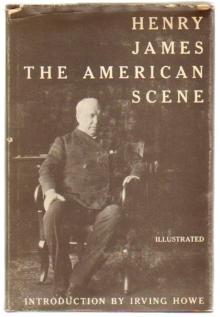 The American
The American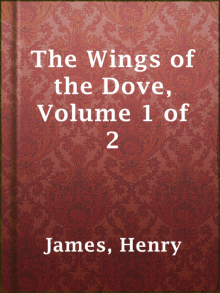 The Wings of the Dove, Volume 1 of 2
The Wings of the Dove, Volume 1 of 2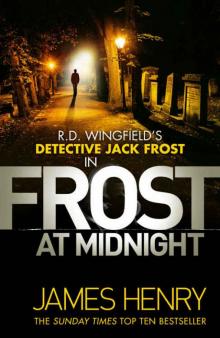 Frost at Midnight
Frost at Midnight Morning Frost
Morning Frost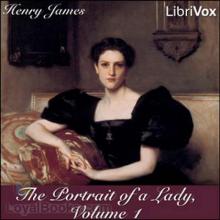 The Portrait of a Lady — Volume 1
The Portrait of a Lady — Volume 1 Fatal Frost
Fatal Frost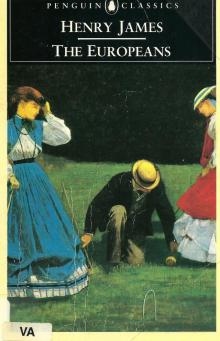 The Europeans
The Europeans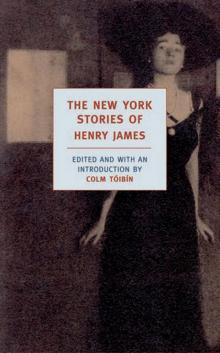 The New York Stories of Henry James
The New York Stories of Henry James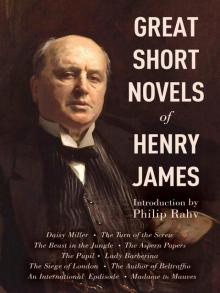 Great Short Novels of Henry James
Great Short Novels of Henry James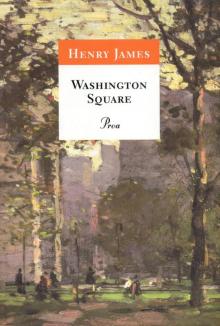 Washington Square
Washington Square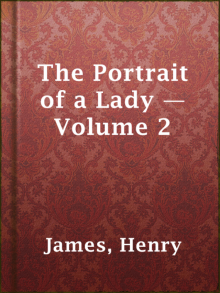 The Portrait of a Lady — Volume 2
The Portrait of a Lady — Volume 2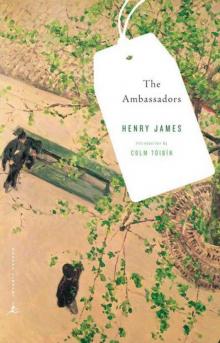 The Ambassadors
The Ambassadors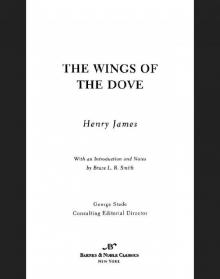 The Wings of the Dove
The Wings of the Dove The Princess Casamassima (Classics)
The Princess Casamassima (Classics) The Coxon Fund
The Coxon Fund First Frost
First Frost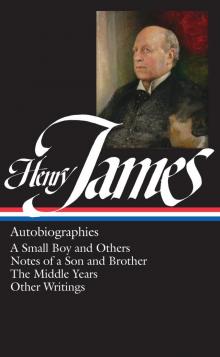 Henry James
Henry James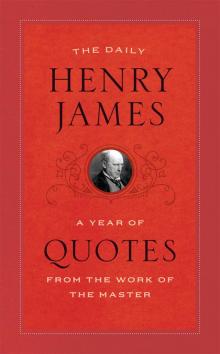 The Daily Henry James
The Daily Henry James Travels With Henry James
Travels With Henry James The Reverberator: A Novel
The Reverberator: A Novel What Maisie Knew (Henry James Collection)
What Maisie Knew (Henry James Collection)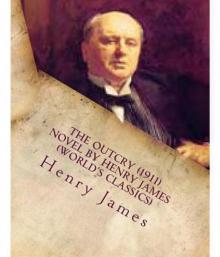 The Outcry
The Outcry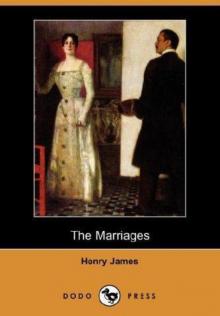 The Marriages
The Marriages The Wings of the Dove, Volume 2
The Wings of the Dove, Volume 2 The Bostonians, Vol. I
The Bostonians, Vol. I The Outcry: -1911
The Outcry: -1911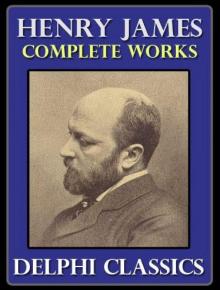 The Complete Works of Henry James
The Complete Works of Henry James Letters from the Palazzo Barbaro
Letters from the Palazzo Barbaro The Pupil
The Pupil The Bostonians, Vol. II
The Bostonians, Vol. II Pandora
Pandora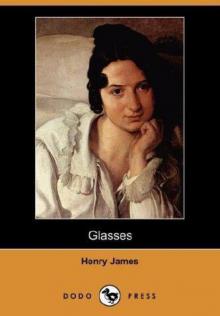 Glasses
Glasses The Princess Casamassima
The Princess Casamassima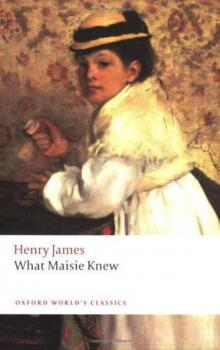 What Maisie Knew
What Maisie Knew The Reverberator
The Reverberator The Golden Bowl - Complete
The Golden Bowl - Complete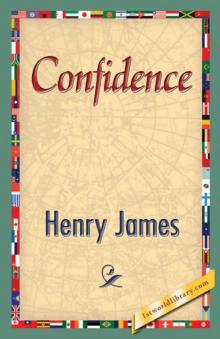 Confidence
Confidence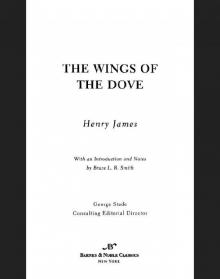 Wings of the Dove (Barnes & Noble Classics Series)
Wings of the Dove (Barnes & Noble Classics Series) The Spoils of Poynton
The Spoils of Poynton